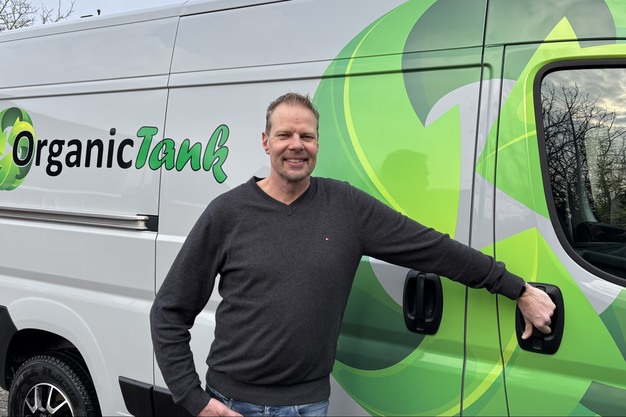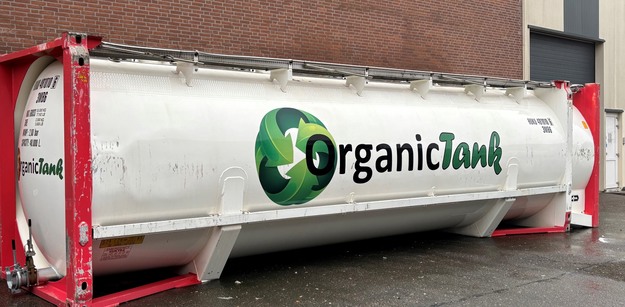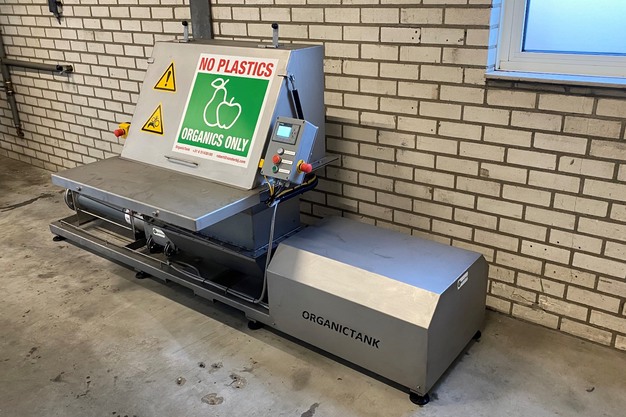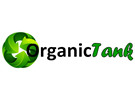Less-than-perfect greenhouse tomatoes that do not sell, onions that rotted in storage, a load of persimmons that did not survive transportation, or a processing plant's byproducts. These leftovers are all in the way, and fresh produce companies would love to wish them away. Is that possible? The Dutch company OrganicTank is giving it a try.
 © OrganicTankRobert van der Bij
© OrganicTankRobert van der Bij
Tanks of various sizes
"Fruit and vegetable companies often throw their waste in containers or box pallets. Those can stand around for days until they're collected and taken to a processing plant. We want to place a tank – a used 20, 30, or 40-foot shipping container – at the horticultural or processing company. That can be either in or outdoors," says Robert van der Bij.
"You toss the organic residual streams into a processing unit where it's chopped into a pulp. That's then pumped into a fully sealed tank. When that's almost full – which could be after a week but also after a month – we get an automatic notification. We immediately go to empty the tank and prepare to take the contents to be composted. There, the byproducts are turned into gas and fertilizers that farmers can use on their fields.'
Scalability
Storage and compostability require organic waste to be sufficiently liquified. Fresh produce waste, such as moist onion scraps or rotting produce that has turned into mush, is ideal. All types and mixtures are possible. Fermentation is ecologically and cost-friendly, but the OrganicTank offers more advantages.
 © OrganicTankThe pulp of the organic waste flows is stored in a tank, in this case a 33-foot tank
© OrganicTankThe pulp of the organic waste flows is stored in a tank, in this case a 33-foot tank
You can manage your waste processing without depending on third parties or storage that takes up space. The waste goes directly into the tank until it is collected – a complete solution. Scalability is another plus: peaks in waste supply (plenty on one day, not so much on another) are not a problem either. The tank keeps everything odor and leak-free, even after weeks.
Cost efficiency
According to Robert, you can easily manage the costs. Besides leasing the machine, disposal is calculated at a flat per-ton rate. "Even tank maintenance is included. There are no hidden costs. We calculate the rate by weight, so transporting a compact, liquid biomass wins cost efficiency-wise over the traditional system, where they transport loose products in a box pallet or container to the processor. Loose product means lots of empty air is transported, which inevitably also means more trips."
 © OrganicTankThe organic waste flows are thrown into the processing unit, where they are chopped into pulp
© OrganicTankThe organic waste flows are thrown into the processing unit, where they are chopped into pulp
You can, theoretically, use certain kinds of organic byproducts as raw materials for fodder. However, the whole chain - disposer, transporter, and processor - must be certified, which entails costs and administration. Here, the residual flow provider is, of course, compensated. "OrganicTank's challenge is to work with customers to keep costs as low as possible," Robert concludes.
 For more information:
For more information:
Robert van der Bij
OrganicTank BV
+31 6 514 38 185
Info@organictank.nl
